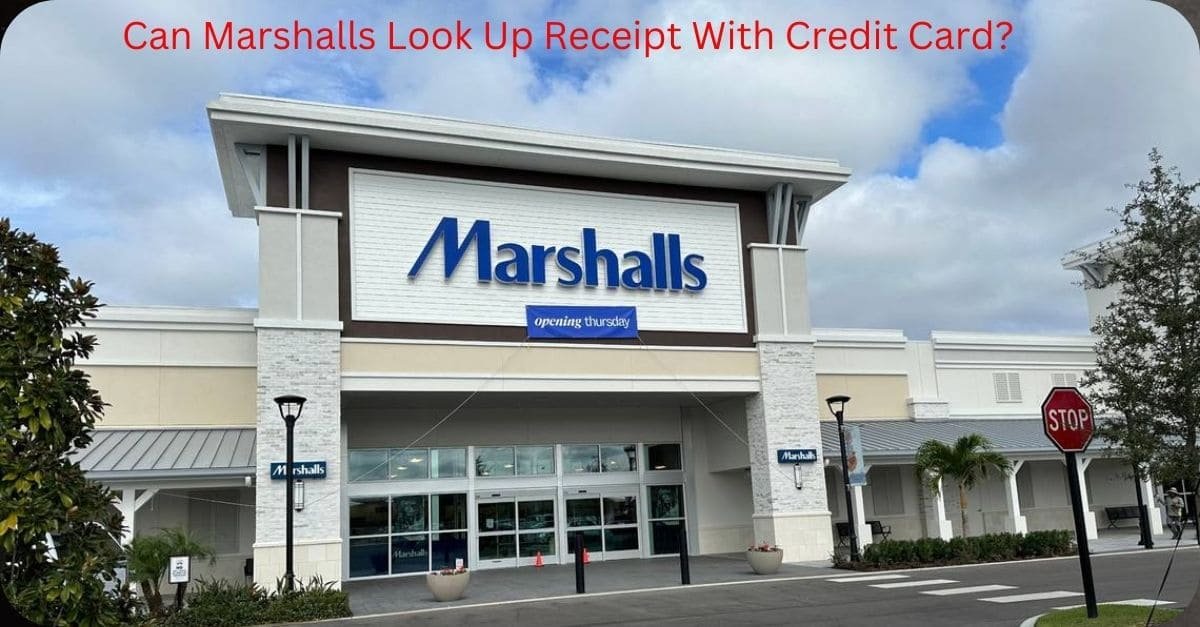
Are you tired of chasing for crumpled receipts? This article digs into the burning question on many shoppers’ minds: Can Marshalls look up your receipt with a credit card? We’ll explore whether Marshalls can find your receipt using your credit card and reveal the convenience of their customer service.
From forgotten to misplaced gift receipts, we’ll discuss how Marshalls handles customer inquiries and the steps you can take for a smooth receipt lookup experience. Whether you’re a frequent Marshalls customer or just curious about their policies, this article aims to provide valuable insights to boost your shopping confidence.
Get ready to uncover the truth behind Marshalls’ receipt lookup process. It’s time to solve the mystery of those wrinkly receipts once and for all.
Table of Contents
How Do Retailers Way to Purchases?
Regarding tracking purchases, retailers employ various methods to ensure accurate record-keeping and provide customers with essential documentation for returns, exchanges, or warranty claims. One standard method is consuming receipts, which serve as proof of purchase. However, receipts can easily get damaged, lost, or forgotten, leaving customers in a bind when they need to access their transaction details.
Many retailers have applied systems to track purchases without a physical receipt to overcome this challenge. These systems typically trust customer information, such as credit card details, to retrieve transaction data from their databases. By associating purchases with precise credit card transactions, retailers can provide customers with the needed documentation, even if the original receipt is unavailable.
The Role of Credit Card Information in Tracking Purchases
Credit card information is vital in tracking purchases, especially in cases where physical receipts are absent. When you purchase using a credit card, the transaction details, including the time, date, and amount, are recorded by the retailer’s point-of-sale system. This information is connected to your credit card account, allowing the retailer to identify and retrieve your transaction history when needed.
Although credit card information provides a convenient way for retailers to track purchases, it’s important to note that this data is usually stored securely and complies with data protection regulations. Retailers rank customer privacy and take measures to ensure the confidentiality of sensitive information. However, it’s always a noble idea to familiarize yourself with a retailer’s privacy policy to understand how they handle and protect your data.
Marshalls’ Receipt Lookup Policy
Marshalls has applied a customer-friendly receipt lookup policy to assist shoppers in accessing their transaction details when needed. This policy aims to provide suitability and peace of mind to customers needing help finding receipts.
To initiate the receipt lookup procedure at Marshalls, you must visit the store where the purchase was made. Head to the customer service desk and deliver them with the credit card you used for the transaction. The customer service illustrative will then locate and print a copy of your receipt, giving you the necessary documentation for returns, exchanges, or warranty claims.
It’s significant to note that Marshall’s receipt lookup policy is subject to certain limitations. The store may only be able to retrieve receipts within a specific timeframe, typically within 30 days from the date of purchase. Additionally, some purchases, such as those ready with cash or gift cards, may not be eligible for a receipt lookup. To ensure a successful lookup, it’s recommended to bring any relevant information, such as the estimated date of purchase, the total amount, or any other details that can assist the customer service representative in locating your transaction.
Alternatives to Retrieving Receipts at Marshalls
While Marshalls deals with a convenient receipt lookup process, there may be instances where you need help to recover your receipt using your credit card information. In such cases, alternative options are available to help you attain proof of purchase.
If you purchased with a credit card, consider contacting your issuer. Particular credit card companies provide online access to transaction history, allowing you to download or print copies of your receipts directly from their website. Otherwise, you can contact the credit card issuer’s customer service and inquire about their receipt retrieval options.
When you purchase by cash or a gift card, retrieving a receipt may be more challenging. However, it’s still cost to contact Marshalls’ customer service or visit the store where the purchase was made to inquire about possible solutions. They can assist you based on their exact policies and procedures.
Protecting Your Privacy When Making Purchases
As consumers, it’s natural to be anxious about privacy when purchasing and providing personal information, such as credit card details. When shopping at Marshalls or any trustworthy retailer, you can rest assured that your privacy is a top priority.
Retailers like Marshalls have harsh protocols in place to safeguard customer information. They adhere to industry standards and conform to data protection regulations to ensure the secure handling of personal data. This includes implementing encryption technology, using secure payment doorways, and regularly updating security measures to protect against unauthorized access.
Reviewing a retailer’s privacy policy to understand how they grip and protect your data is always a good practice. This will provide you peace of mind and help you make informed decisions when sharing personal information during purchasing.
Recommended Article: Can you Use Student Loans to Pay off Credit Cards?
Tips for Keeping Track Of Your Receipts
While Marshalls and other retailers offer receipt lookup services, developing good habits for keeping track of your receipts is still beneficial. By staying organized, you can minimize the need for receipt retrieval and have easy access to your transaction details when required.
- Create a designated storage system: Designate a specific place, such as a folder or envelope, to store your receipts. This will help you avoid misplacing or losing them.
- Sort receipts by date or category: Organize your receipts by date or category, making it easier to locate specific transactions when needed.
- Digitize your receipts: Consider using a mobile app or scanner to digitize your receipts. This allows you to store them electronically and access them conveniently from your device or cloud storage.
- Take photos of necessary receipts: If you’re worried about losing a critical receipt, take a photo of it as a backup. This ensures you have a digital copy in case the receipt goes missing.
- Review and reconcile regularly: Set aside time to review your receipts and reconcile them with your bank or credit card statements. This helps identify any discrepancies or unauthorized charges.
By implementing these tips, you can create a streamlined system for managing your receipts and reduce the hassle of retrieving them in the future.
Other Ways to Track Purchases Without a Receipt
While Marshalls’ receipt lookup process is convenient, there may be instances where you’re unable to retrieve a receipt. In such cases, alternative ways exist to track purchases and obtain the necessary documentation.
If you made a purchase using a credit card, you can often contact your credit card issuer for assistance. They can provide you with a transaction history statement, which can be proof of purchase for returns or warranty claims.
Additionally, some retailers offer loyalty programs or digital accounts that allow you to track your purchases online. You can digitally access your transaction history and receipts by signing up for these programs or creating an account. This eliminates the need for physical receipts and provides a convenient way to track purchases.
Lastly, it’s worth noting that some purchases may be eligible for returns without a receipt, especially if you paid with a credit card. Retailers often have policies. That allows them to look up your purchase using your credit card information and provide store credit, even without a physical receipt. However, these policies can vary, so it’s best to check with the retailer directly to understand their guidelines.
Conclusion:
In conclusion, Marshalls can look up your receipt with a credit card, providing a solution to track your transaction details. Visit the store where you make purchases. There, provide your credit card information. Marshalls’ customer service representatives can retrieve and print a copy of your receipt.
While receipt lookup is valuable, developing good habits for organizing and storing your receipts is still advisable. By creating a designated storage system, you can minimize the need for receipt retrieval in the future.
Remember, privacy is a priority for retailers like Marshalls, and they take measures to protect your personal information. Please familiarize yourself with their privacy policy and ensure your data is handled securely.
[flexible-faqs id=’2112′]






